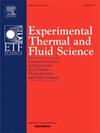Experimental investigation of Multi-Mode heat transfer to a Free-Falling dilute particle cloud in a heated vertical tube
Abstract
The development of dilute particle heat exchangers and reactors for advanced energy systems requires an understanding of the multi-mode heat transfer from a heated wall to falling particles. This study presents experimental results of the overall heat transfer coefficient for a free-falling, dilute flow of particles with solid volume fraction from 0.0005 to 0.006 corresponding to feed rates from 3.7 kg s−1 m−2 to 44 kg s−1 m−2 in a vertical, heated tube containing quiescent air at atmospheric pressure. Tube wall temperatures are varied between 300°C to 900°C while keeping the particle inlet temperature constant. The experimental results show that the overall heat transfer coefficient is a strong function of particle feed rate and surface temperature. Good agreement was obtained with prior studies conducted at comparable temperatures but lower particle feed rates (<4 kg m−2 s−1). The established correlations for particle-to-wall radiation and particle-to-gas convection were used to estimate the wall-to-gas convective contribution from the measured overall heat transfer coefficient. The experimental results indicated a 4 to 6 times improvement in the wall convection in the solid–gas mixture compared to that expected from natural convection in a single-phase gas. The data presented here are applicable to characterize heat transfer in dilute particle heat exchangers, furnaces, and solar receivers.

 求助内容:
求助内容: 应助结果提醒方式:
应助结果提醒方式:


